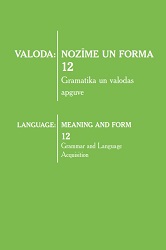Lexicogrammatical aspects in English for dentistry acquisition materials
Lexicogrammatical aspects in English for dentistry acquisition materials
Author(s): Indra Karapetjana, Gunta RozinaSubject(s): Morphology, Syntax, Lexis, Health and medicine and law
Published by: Latvijas Universitātes Akadēmiskais apgāds
Keywords: English for Dentistry; lexicogrammatical aspects; derivational morphology;
Summary/Abstract: In the 21st century, globalization and massive migration have increased the global demand for effective transnational communication skills in English in the health care workplace and academic contexts, including dentistry. English for Dentistry falls under the umbrella of English for Specific Purposes (ESP): this refers to teaching and learning English as a foreign language in a particular domain. While the role of grammar acquisition in ESP courses is often understated in the key theoretical literature on ESP, this article highlights the importance of lexicogrammatical knowledge. Dentistry students and practitioners in Latvia highly value the accuracy in communication since the knowledge of various syntactic and morphological rules of grammar and their use in the dentistry-related context contribute to the accuracy required in the performance of different communicative tasks, for instance, asking for, explaining, and providing information, giving instructions. Besides, if dentists are unable, for example, to explain a diagnosis, agree on treatment options with the patient in a meaningfully accurate way, the dentist’s authority may be undermined, resulting in unsuccessful communication. The case study reports on the tasks employing lexicogrammatical strategies in the material “Dentistry and Language Integrated Learning”, which has been developed by the authors of this article working in close collaboration with individual academic staff at the the Faculty of Medicine of the University of Latvia. The material piloted amongst both dentistry practitioners and students suggests that the applied strategies of morphological derivation, for instance, recognizing and building new words by gaining control of affixation devices, can be considered as useful tools in the new lexeme meaning-making process in dentistry. As a result, this study has attempted to support the assumption that ESP and content and language integrated learning (or CLIL) are compatible and can be efficiently mastered in the professional discourse development process.
Journal: Valoda: nozīme un forma
- Issue Year: 2021
- Issue No: 12
- Page Range: 64-73
- Page Count: 10
- Language: English

